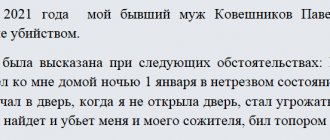Criminal Code of the Russian Federation in the latest edition:
Article 60 of the Criminal Code of the Russian Federation. General principles of sentencing
1. A person found guilty of committing a crime is given a fair punishment within the limits provided for by the relevant article of the Special Part of this Code, and taking into account the provisions of the General Part of this Code. A more severe type of punishment from among those provided for the crime committed is assigned only if a less severe type of punishment cannot ensure the achievement of the goals of the punishment.
2. A more severe punishment than provided for by the relevant articles of the Special Part of this Code for the crime committed may be imposed for the totality of crimes and for the totality of sentences in accordance with Articles 69 and this Code. The grounds for imposing a less severe punishment than provided for by the relevant article of the Special Part of this Code for a crime committed are determined by Article 64 of this Code.
3. When assigning punishment, the nature and degree of public danger of the crime and the personality of the perpetrator, including circumstances mitigating and aggravating the punishment, as well as the impact of the imposed punishment on the correction of the convicted person and on the living conditions of his family, are taken into account.
Return to the table of contents of the document: Criminal Code of the Russian Federation in the latest edition
Comments on Article 60 of the Criminal Code of the Russian Federation
The punishment imposed on the guilty person must be fair . In accordance with criminal law, fairness of punishment means its compliance with the nature and degree of social danger of the crime, the circumstances of its commission and the identity of the perpetrator (Article 6 of the Criminal Code of the Russian Federation). In order for the court to assign a fair punishment to each guilty person, the Criminal Code of the Russian Federation provides for general principles for their appointment, i.e. rules that the court must follow when deciding on punishment for a crime.
The general provisions for imposing punishment are enshrined in Art. 60 of the Criminal Code of the Russian Federation “General principles of sentencing.”
These principles are a guarantee of fair and appropriate punishment. They promote compliance with the requirements of the law when choosing an individual punishment for a specific person for a specific crime.
The general principles of sentencing are the fundamental rules (requirements) formulated in criminal law that the court must follow when imposing punishment. It is assigned:
- within the limits provided for by the relevant article of the Special Part of the Criminal Code of the Russian Federation;
- taking into account the provisions of the General Part of the Criminal Code of the Russian Federation;
- taking into account the nature and degree of public danger of the crime, the identity of the perpetrator, etc.
The court imposes a punishment taking into account the provisions of the General Part of the Criminal Code of the Russian Federation
This requirement to a certain extent specifies the above rule. It is due to the fact that in some cases, in order to correctly assign punishment within the sanction of the norm of the Special Part of the Criminal Code of the Russian Federation, it is necessary to refer to the relevant provisions of the General Part of the Criminal Code of the Russian Federation, which determine the features of each type of punishment, starting from the minimum and maximum term (size) and ending with its content.
1) The court is obliged to consider the possibility of imposing a more lenient punishment
As a general rule, if the sanction of the criminal law, along with deprivation of liberty, provides for other types of punishment, the court’s decision to impose imprisonment must necessarily be motivated in the sentence. For these purposes, the law provides for a wide choice of alternative punishments to imprisonment and other criminal law measures.
Paragraph 27 of the Resolution of the Plenum of the Supreme Court of the Russian Federation dated December 22, 2015 N 58 “On the practice of imposing criminal punishment by the courts of the Russian Federation” contains the following explanations:
A more severe type of punishment from among those provided for the crime committed is assigned only if a less severe type of punishment cannot ensure the achievement of the goals of the punishment.
In the event that a convicted person, by virtue of the provisions established by law, cannot be assigned any of the types of punishment provided for by the relevant article of the Special Part of the Criminal Code of the Russian Federation (for example, compulsory labor - by virtue of Part 4 of Article 49 of the Criminal Code of the Russian Federation, corrective labor - by virtue of Part 5 of Article 50 of the Criminal Code of the Russian Federation, arrest - due to its non-application at the present time, deprivation of liberty - by virtue of Part 1 of Article 56 of the Criminal Code of the Russian Federation), he should be given any more lenient punishment than provided for by the sanction of the relevant article. A reference to Article 64 of the Criminal Code of the Russian Federation is not required in this case.
2) The court is obliged to take into account the provisions of the Criminal Code of the Russian Federation that limit the application of the most severe punishment
The court must take into account the provisions of the General Part of the Criminal Code of the Russian Federation, which establish restrictions (Articles 62, - 66 of the Criminal Code of the Russian Federation) in the application of the most severe punishment (its type, duration, amount) provided for by the sanctions of the articles under which the acts are qualified. So, for example, part 2 of Art. 66 of the Criminal Code of the Russian Federation establishes a provision according to which the term or amount of punishment for an attempted crime cannot exceed three quarters of the maximum term or amount of the most severe type of punishment provided for by the corresponding article of the Special Part of the Criminal Code of the Russian Federation for the completed crime. If the jury makes a leniency verdict, the death penalty and life imprisonment (Part 1 of Article 65 of the Criminal Code of the Russian Federation), etc. are not applied.
The Criminal Code of the Russian Federation provides for several types of mandatory mitigation of criminal punishment by the court:
- minors (Article 88 of the Criminal Code of the Russian Federation);
- in the presence of mitigating circumstances provided for in paragraph “and” (or) “k” of Part 1 of Art. 61 of the Criminal Code of the Russian Federation;
- within the framework of a pre-trial cooperation agreement (parts 2 and 4 of Article 62 of the Criminal Code of the Russian Federation);
- when considering a criminal case in a special manner provided for in Chapter. 40 Code of Criminal Procedure of the Russian Federation;
- in the presence of exceptional circumstances allowing the imposition of a more lenient punishment than provided for this crime (Article 64 of the Criminal Code of the Russian Federation);
- in case of a jury verdict on leniency (Article 65 of the Criminal Code of the Russian Federation);
- for an unfinished crime (Article 66 of the Criminal Code of the Russian Federation).
3) The court, when assigning punishment, has the right to go beyond the maximum limits of the sanction of the article
When assigning punishment, it is possible to go beyond the maximum limits established for each type of punishment. For example, according to Art. 56 of the Criminal Code of the Russian Federation, the maximum term of imprisonment is twenty years, and in accordance with Part 4 of this article, imprisonment imposed for a totality of crimes can be twenty-five years, and for a totality of sentences - thirty years.
4) The court may apply a punishment not included in the sanction of the article of the Special Part of the Criminal Code of the Russian Federation
Taking into account the provisions of the General Part of the Criminal Code of the Russian Federation also presupposes the possibility, when imposing a punishment, to apply not only the punishments provided for by the sanction of the article of the Special Part of the Criminal Code of the Russian Federation, but also punishments not included in the sanction .
Thus, punishment in the form of deprivation of a special, military or honorary title, class rank and state awards (Article 48 of the Criminal Code of the Russian Federation) is not included in any sanction of the articles of the Special Part of the Criminal Code of the Russian Federation, but it can be applied for committing a grave or especially grave crime, taking into account the identity of the culprit. Punishment in the form of deprivation of the right to hold certain positions or engage in certain activities (Article 47 of the Criminal Code of the Russian Federation) may be imposed as an additional type of punishment in cases where it is not provided for in the relevant article of the Special Part of the Criminal Code of the Russian Federation, if, taking into account the nature and degree of public danger of the crime committed crime and the identity of the perpetrator, the court finds it impossible to retain his right to occupy certain positions or engage in certain activities.
5) The court, when assigning punishment, does not take into account aggravating circumstances
Taking into account the provisions of the General Part of the Criminal Code of the Russian Federation also consists in the need to ignore aggravating circumstances in cases established by law. So, in accordance with Part 4 of Art. 65 of the Criminal Code of the Russian Federation, when assigning a sentence to a person found guilty of committing a crime by a jury verdict, but deserving leniency, aggravating circumstances are not taken into account.
6) The court increases the terms or amount of punishment for a crime based on the totality of crimes and the totality of sentences
Taking into account the provisions of the General Part of the Criminal Code of the Russian Federation when assigning punishment lies in the possibility of going beyond the sanction of the corresponding article of the Criminal Code of the Russian Federation, increasing the terms or amount of punishment within the framework of the law. Such possibilities are strictly limited. A more severe punishment than provided for by the relevant articles of the Special Part of this Code for the crime committed can be assigned only for the totality of crimes and for the totality of sentences in accordance with Art. Art. 69 and 70 of the Criminal Code of the Russian Federation. These are those cases when punishment is imposed not for one, but for the commission of several crimes, which should also be reflected in the amount of punishment.
Within the sanction of the article of the Special Part of the Criminal Code of the Russian Federation, a relatively more severe punishment can also be imposed in case of recidivism of crimes (Part 3 of Article 68 of the Criminal Code of the Russian Federation).
Criminal penalty
For committing a crime, criminal liability is imposed— criminal punishment.
Rodion Raskolnikov is the hero of the novel by F.M. Dostoevsky's Crime and Punishment rebelled against the rules of society. But he also agreed that retribution and punishment are inevitable for blood. There is no sin without atonement, and no crime without punishment.
What are the general principles of sentencing? A person found guilty of committing a crime is given a fair criminal punishment within the limits provided for by the relevant article of the special part of the Criminal Code, and taking into account the provisions of the general part of the code. The sanction of the article is designed in such a way that the punishment is indicated from mild to more severe (for example, a fine is indicated first, and then imprisonment). A more severe type of punishment from among those provided for the crime committed is assigned only if a less severe type of punishment cannot ensure the achievement of the goals of the punishment. When assigning punishment, the nature and degree of social danger of the crime and the personality of the perpetrator are taken into account, including circumstances mitigating and aggravating the punishment, as well as the impact of the imposed punishment on the correction of the convicted person and on the living conditions of the family.
The law establishes types of criminal punishment . They can be basic (i.e. applied independently), additional (i.e. applied in addition to the main one), basic and additional (i.e. can be used by the court independently or in addition to the main types of punishment).
Punishment is a measure of state coercion applied by the court to persons who have committed crimes
Principles of punishment:
- legality
- humanity
- individuality
Purposes of punishment:
- restoration of social justice
- correction and re-education
- crime prevention
Features of punishment:
- public measure on behalf of the state
- measure defined by law (types, size, order of appointment, etc.)
- a measure that deprives or restricts the rights and freedoms of a person
- measure applied only to persons guilty of a crime
- a measure applied only by the court upon its verdict
is an exceptional and at the same time always the main measure of criminal punishment . This is clearly seen from the diagram below.
Types of punishments under criminal law:
Basic:
- compulsory work
- correctional labor
- military service restriction
- restriction of freedom
- arrest
- detention in a disciplinary military unit
- imprisonment for a fixed period
- life imprisonment fine
Basic and additional:
- fine
- deprivation of the right to hold certain positions or engage in certain activities
Additional:
- deprivation of a special, military or honorary title, class rank and state awards
- confiscation of property
Exceptional:
- the death penalty
Even in ancient times, people thought about the justice and correctness of punishment.
The ancients depicted the goddess of justice as a woman. She was blindfolded so as not to see who she was judging and to be objective. In one hand she held a punishing sword, and in the other - scales. Circumstances that mitigated responsibility were symbolically placed on one side of the scale, and aggravated on the other.
The following are recognized as mitigating circumstances:
- a) committing a crime of minor gravity for the first time due to an accidental coincidence;
- b) the minority of the perpetrator;
- c) pregnancy;
- d) the presence of young children with the perpetrator;
- e) committing a crime due to a combination of difficult life circumstances or out of compassion;
- f) committing a crime as a result of physical or mental coercion or due to financial, official or other dependence;
- g) commission of a crime in violation of the conditions of legality of necessary defense, detention of the person who committed the crime, extreme necessity, justified risk, execution of an order or instruction;
- h) illegality or immorality of the behavior of the victim, which was the reason for the crime;
- i) confession, active assistance in solving the crime, exposing other accomplices in the crime and searching for property obtained as a result of the crime (this is what Vladimir Dahl’s famous dictionary says about repentance: “Without remorse, there is no forgiveness”, “And he repented, but you can’t turn it back” "How aptly they convey the meaning of sincere repentance after committing a crime!);
- j) providing medical and other assistance to the victim immediately after the commission of a crime; voluntary compensation for property damage and moral harm caused as a result of the crime, other actions aimed at making amends for the harm caused to the victim.
This list is not exhaustive and the court, depending on the specific case and the personality of the defendant, may consider any other mitigating circumstance. When imposing a criminal penalty, circumstances not provided for by the Criminal Code may be taken into account as mitigating factors.
The following are considered aggravating circumstances:
- a) repetition of crimes, relapse of crimes;
- b) the onset of grave consequences as a result of the commission of a crime;
- c) committing a crime as part of a group of persons, a group of persons by prior conspiracy, an organized group or a criminal community (criminal organization);
- d) a particularly active role in the commission of a crime;
- e) involvement in the commission of a crime of persons who suffer from severe mental disorders or are in a state of intoxication, as well as persons who have not reached the age at which criminal liability begins (wisely noted in the Russian proverb “A drunken man’s sins, but a sober one’s answer”);
- f) committing a crime motivated by national, racial, religious hatred or enmity, out of revenge for the lawful actions of other persons, as well as in order to conceal another crime or facilitate its commission;
- g) commission of a crime against a person or his relatives in connection with the performance of official activities by this person or the performance of a public duty;
- h) committing a crime against a woman who is known to be pregnant by the perpetrator, as well as against a minor, another defenseless or helpless person or a person dependent on the perpetrator;
- i) committing a crime with particular cruelty, sadism, mockery, and torture for the victim;
- j) committing a crime with the use of weapons, ammunition, explosives, explosive or simulating devices, specially manufactured technical means, toxic and radioactive substances, medicinal and other chemical and pharmacological preparations, as well as with the use of physical or mental coercion;
- k) committing a crime during a state of emergency, natural or other public disaster, as well as during mass riots;
- l) committing a crime using the trust placed in the perpetrator by virtue of his official position or contract;
- m) committing a crime using the uniform or documents of a government representative.
If an aggravating circumstance is provided for by the relevant article of the special part of the code as a sign of a crime, it in itself cannot be taken into account again when assigning a criminal penalty.
Certain rules exist for sentencing minors; persons who committed a crime in a state of insanity; or after committing a crime by a person suffering from mental illness.
The criminal law provides for a whole system of measures that testify to the humanism of our state and the desire to correct a minor, primarily through educational measures. If the court finds that the correction of a person who has committed a crime under the age of eighteen that does not pose a great public danger is possible without the application of criminal punishment, it may apply to such person compulsory educational measures that are not criminal punishment. A minor may be released from criminal liability and referred to a commission on juvenile affairs to consider the application of compulsory educational measures against him.
The consideration of a criminal case by the court, the court verdict and the assigned criminal punishment are always associated with legal and moral consequences not only for the convicted person himself, but also for others. The family, relatives, and comrades of the convicted person experience deep emotions.





